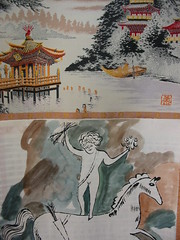
We come here and we are sometimes taken by surprise at the differences we find. Some are intriguing while others leave us uncomfortable, touched a little too close to the certitude of beliefs in right and wrong to let slide. Different people react in different ways, some dive in, some withdraw into insularity, others amble somewhere in between. Many become self-certified experts on the flaws and shortcomings of locals and their locality, wanton commentators on the national mood, the state of the republic, the mindset of the masses. I know, I have been through a few phases of expatriacy, I have at times thought I had my finger on some pulse that turned out to be nothing more than the droning sighs of distant blasting caps clearing the way for the latest state level project.
I have had the presumption to think that I understood, that millenia of history and the knotted fortunes of this nation could in the end result in no more complex a web of lives and mores than the social nexus of some North-American suburb. I have thought people simplistic and ignorant, unskilled, without tact, even downright bestial, because they did not behave as I would have them behave, according to those standards which I had absorbed elsewhere, like fumes through the air. The assumption of some expats that we are products of a more perfect human assembly line, that we are somehow right to the Chinese wrong in countless aspects of daily life, the exasperation that some exhibit in dealing with people who may have a different take on things, and in their country no less, is unfortunate.
What is worse is to portend that we have cracked the secret of China in the 21th century, the inner lives of its citizens in their infinite diversity of settings has been revealed to us and we can map the course of their future, ideological and physical, evolution like one might the migratory route of an animal.
History can be a useful tool in attempting to unravel present enigmas, but human history is suffused with perspectives that forego the ideal of subjectivity in favor of something closer in hue and feel to the color of blood and the sting of emotion. When the history we observe is made a record of memory, malleable, sensitive and personal, rather than a statement of fact, the corruption of current understandings is inevitable and complete. This is why we doubt the accuracy of Chinese historical accounts of the past 60 years, because we see them as tainted by intent, by the purpose of indoctrination, by the impurity of emotion. Perhaps we should give our own understanding of this country and its people a second thought, in the event that it may be impaired by the failings of our imagination.








Okay… so your first trip to P.R. China was an eye opener, congrats. English Lit Major by chance?
@Mathew
“so your first trip to P.R. China was an eye opener”
Where does it say that? I couldn’t find it.
Couldn’t disagree more Matthew. True, Gabriel’s prose is a bit more styled than is usual around here – but his point is a good one and I think it’s a fantastic post.
Are two passages that I think are particularly insightful.
Gabriel’s prose is a pleasure to read and his posts thought-provoking, long may they grace LL and encourage debate.
@ Gabriel. I rarely post so much opinion, so openly, on the web. I can’t help feeling that this post contradicts your previous post… and I’m presuming it’s deliberate. I feel it’s a response to Nedzer, whose initial rebuttals are quite relevant and perhaps were a catalyst?
Regardless, the gist of this post is that we can not, and should not pretend to know and judge another country without being very aware of our own cultural lens.
Gabriel’s “Words on Paper, Words on Walls†is such an excellent example of pro-democracy expat thinking: it “portends†to the future of China as a democratic society, as a civilisation that should be at the forefront of “human progress in our time†and that the only reason it isn’t is because of its nation’s leadership and lack of democracy. Here then are the Chinese, held against their will, voiceless, behind the great gag of their “flawed†self-appointed leader. I know because I’ve believed this myself, but in assuming old China will emerge from its socialist-with capitalist-blah-blah-blah ashes into a flaming phoenix under democracy is (excuse the over-simplification here) to suggest that the “millenia of history and the knotted fortunes of this nation could in the end result in no more complex a web of lives and mores than the social nexus of some North-American [or in my case British] suburb.†I, for one, hope this will not happen, and in any case, it rather contradicts my experience here and the voice of every Chinese I’ve ever met and asked.
I think the last sentence of this post is something to make us all think twice: “Perhaps we should give our own understanding of this country and its people a second thought, in the event that it may be impaired by the failings of our imagination.â€
It’s fair to say my small “understanding†of China changes every single day, and reading and commenting on these posts has only changed it again. It’s also fair to say that my “imagination” can’t see beyond democracy, but perhaps China will…
Sorry folks, tend to give weight more to the laconic than the verbose. The theme was not hard to agree with – there is always a set of preconceptions that we bring to our first encounters that are quickly dispelled and/or proven false.
@Ji Feng Jing Cao
“Where does it say that? I couldn’t find it.”
Sorry about that, it was a figure of speech. Merely commenting on the first paragraph or so of the article.